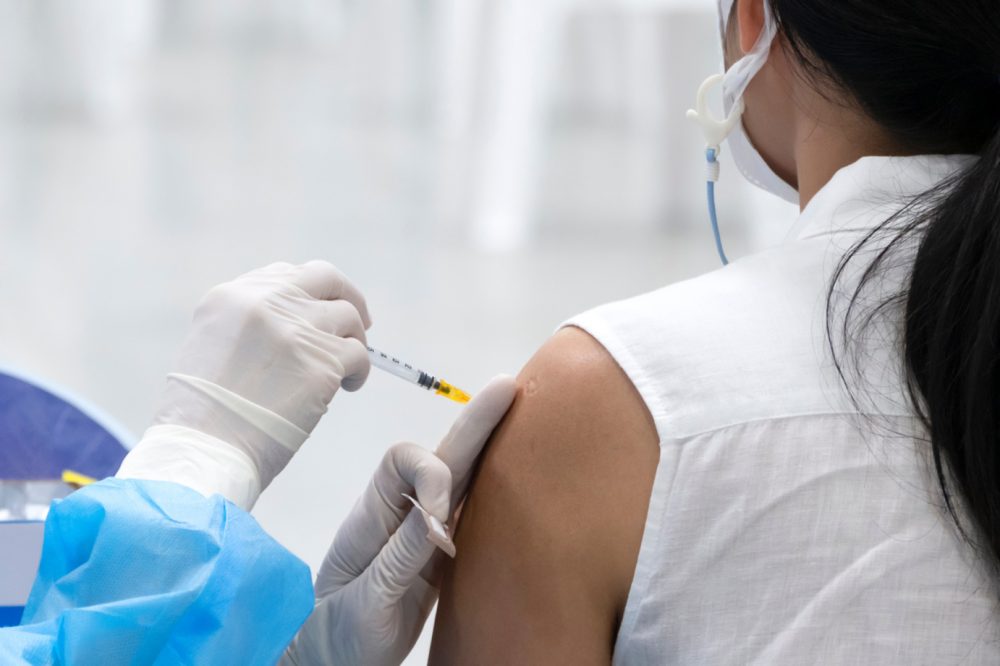Advertisment
Additional COVID vaccine helps protect transplant patients

Additional booster doses of vaccine against COVID-19 are particularly important for those who are immunosuppressed, namely those who have had solid organ transplants, a new study shows.
The study, published in the Journal of Infectious Diseases, shows that even after vaccination, patients taking immunosuppressive medications to prevent rejection of an organ transplant have higher risk for severe COVID-19 than those with competent immune systems.
But vaccination with three doses of an mRNA vaccine — the first two COVID-19 vaccines authorized for use in the U.S. are messenger RNA (mRNA) vaccines — led to substantially greater protection than two doses, the study shows.
“The immune response to vaccination is often blunted in people with moderate to severe immunosuppression,” said Wesley Self, MD, MPH, principal investigator of the study and associate professor of Emergency Medicine and Vice President for Clinical Research Networks and Strategy at Vanderbilt University Medical Center. “Hence, throughout the COVID-19 pandemic, there has been a concern that immunocompromised people, such as those with a solid organ transplant, may not benefit from vaccination as much as immunocompetent people,” he said.
Although the data in the study confirms that after vaccination patients taking immunosuppressive medications to prevent rejection of an organ transplant have higher risk for severe COVID- 19 than those with competent immune systems, there’s also good news.
“Additional vaccine doses appear to substantially increase the effectiveness of vaccination for transplant patients,” Self said.
For example, among transplant patients, a regimen of two doses of mRNA COVID-19 vaccine was only 29% effective at preventing hospitalization due to COVID-19, while a regimen of three doses was 77% effective.
“The results of this real world, multicenter collaborative study indicate that solid organ transplant recipients benefit from three doses of mRNA COVID-19 vaccine, and support CDC recommended vaccine policies for a three-dose primary series in this vulnerable population,” said Jennie Kwon, DO, MSCI, the first author of the study and assistant professor of Medicine at Washington University in St. Louis and associate healthcare epidemiologist at Barnes-Jewish Hospital.
“We believe these results demonstrate that solid organ transplant recipients remain at risk for COVID-19 despite vaccination and support the need for continued efforts to mitigate the risk of COVID in this population. It illustrates that booster vaccine doses are particularly important for immunosuppressed people,” Self said, adding that fourth doses of the mRNA vaccines are now recommended for people with moderate-to-severe immunocompromising conditions, including solid organ transplant.
The study looked at 10,425 hospitalized patients across 21 hospitals — 440 who had had solid organ transplants, 1,684 with other immunocompromising conditions and 8,301 whose immune systems were competent. Future analysis will be important to understand the effectiveness of fourth doses, the residual risk of severe COVID-19 among solid organ transplant recipients after four vaccine doses and the durability of protection. In addition, other measures to reduce the risk of COVID-19 among solid organ transplant recipients should be considered, including vaccination of close contacts, individual immune monitoring and infection prevention strategies such as face masking in public spaces and physical distancing.
The study is part of the IVY (The Influenza and Other Viruses in the Acutely Ill) Research Network, originally created in 2019 to investigate the epidemiology of severe illnesses caused by viral respiratory infections and the effectiveness of vaccines in preventing these illnesses. The network, funded by the Centers for Disease Control and Prevention and led by Vanderbilt University Medical Center, consists of 21 large adult hospitals geographically dispersed across the U.S. Self is principal investigator for the network.
Journal Reference:
- Jennie H Kwon, Mark W Tenforde, Manjusha Gaglani, H Keipp Talbot, Adit A Ginde, Tresa McNeal, Shekhar Ghamande, David J Douin, Jonathan D Casey, Nicholas M Mohr, Anne Zepeski, Nathan I Shapiro, Kevin W Gibbs, D Clark Files, David N Hager, Arber Shehu, Matthew E Prekker, Sean D Caspers, Matthew C Exline, Mena Botros, Michelle N Gong, Alex Li, Amira Mohamed, Nicholas J Johnson, Vasisht Srinivasan, Jay S Steingrub, Ithan D Peltan, Samuel M Brown, Emily T Martin, Akram Khan, Catherine L Hough, Laurence W Busse, Abhijit Duggal, Jennifer G Wilson, Cynthia Perez, Steven Y Chang, Christopher Mallow, Randal Rovinski, Hilary M Babcock, Adam S Lauring, Laura Felley, Natasha Halasa, James D Chappell, Carlos G Grijalva, Todd W Rice, Kelsey N Womack, Christopher J Lindsell, Kimberly W Hart, Adrienne Baughman, Samantha M Olson, Stephanie Schrag, Miwako Kobayashi, Jennifer R Verani, Manish M Patel, Wesley H Self. mRNA Vaccine Effectiveness Against COVID-19 Hospitalization Among Solid Organ Transplant Recipients. The Journal of Infectious Diseases, 2022; DOI: 10.1093/infdis/jiac118





